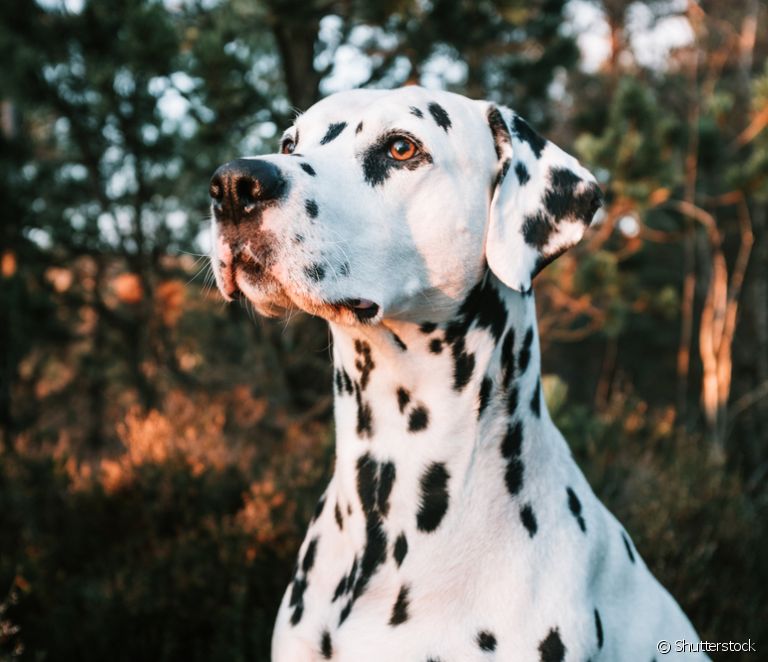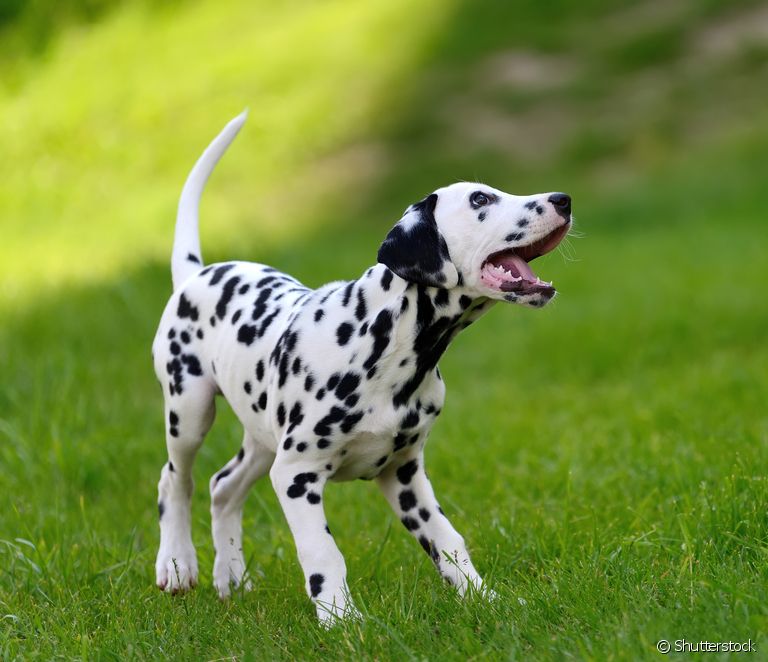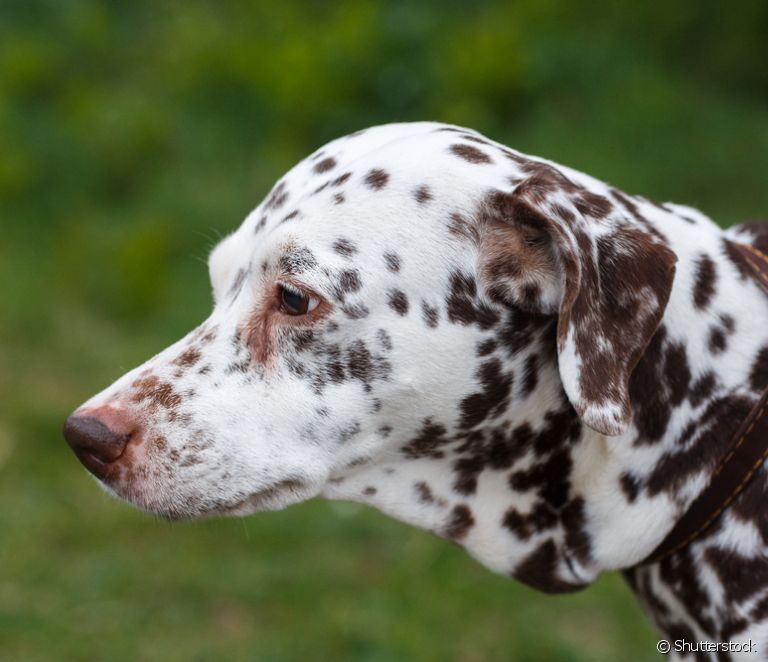All about the Dalmatian: learn about the characteristics, personality and care of this large dog breed

Table of contents
A Dalmatian dog is easily recognized thanks to its particular appearance and also to the film "101 Dalmatians", a cartoon that became very popular in the 60s and is still a great success today. But what is so special about this little dog, besides its famous spots? For those who have always wanted to have a Dalmatian to call their own, the time has come to unveil everything about this dog breedgreat: physical characteristics, temperament, personality, what care is needed, price and how is the health of this animal. Come and we'll tell you!
Origin of the Dalmatian breed is uncertain
Although it is not possible to say with certainty what the origin of the Dalmatian dog is, the name of the breed comes from a region called Dalmatia, which today is located in Croatia. The date when this happened is not yet known, but it was there that the first traces of this little dog were found. However, it is believed that this breed of dog is even older than the traces point out, since severalAncient paintings of tombs in Egypt recorded dogs with the same physical characteristics of a Dalmatian, raising the hypothesis that the existence of this animal dates from that time. The official registration of the breed, however, only happened in 1888 by the American Kennel Club.
Dalmatian: physical characteristics go beyond the dark spots on the body
There's no denying it: the Dalmatian's coat is its trademark. But the most curious thing is that, contrary to popular belief, the puppies of this breed are not born with black spots all over their bodies. In fact, for the first two weeks of life, the Dalmatian puppy is completely white, and it's only after this period that the spots begin to appear, giving it the charming touch that the Dalmatian is known for.These marks scattered around the body can have two color variations: black or brown, and the predominant coat color is always white. In addition, it is also worth mentioning that these spots are unique in each Dalmatian, that is, you will never be able to find two dogs of the breed with the same pattern!
Still on the hair of the Dalmatian dog: although the breed has a short and smooth coat, certain care must be taken, because they are dogs that tend to shed a lot of hair. As for the size of the animal, it is important to keep in mind that it is a large dog, and an adult Dalmatian can be between 54 and 60 cm tall and weigh around 18 to 27 kg. Yes, they are really quite big -...it is not for nothing that some people refer to them as Giant Dalmatians.
Dalmatian: the dog's temperament is docile but full of energy
For those who dream of having a companion full of love to give, the Dalmatian can be the ideal puppy! They are super loving and attached to the family, and if they have the proper training, they also serve as excellent guard dogs. Children often love the Dalmatian puppy, mainly because of their more energetic and playful side, but it is important to have some care with this. As thatis a large and very active dog, very small children may end up hurting themselves trying to socialize with the little dog. He doesn't do it on purpose, of course, but it's just that these animals are really quite agitated and don't like to sit still for long.
This, in fact, turns out to be a great quality for guardians who like to practice physical activities, since the Dalmatian dog gets along very well with some sports, such as running and even swimming. Therefore, the guardian cannot fail to take his friend for a walk every day to spend all the energy they have. Otherwise, destructive behaviors may begin to appear, becausethese animals will try to "discharge" all their energy indoors.
Although they do not bark much, training is indicated for this breed, since these dogs may have some obedience problems. But, in general, the training is very smooth, as the Dalmatian is extremely intelligent and has a lot of ease in learning the commands. In addition, the socialization of the breed is also important, since, although they are very affectionate with their family, theDalmatian puppies tend to be suspicious around strangers and, in some cases, may even develop more aggressive behavior. Therefore, the recommendation is that both training and socialization take place with the Dalmatian puppy, not adult, to obtain faster and more efficient results.










Dalmatian: dog needs some care on a daily basis
- Bathing and grooming:
With a short and smooth coat, the Dalmatian does not require so much care with its appearance. What weighs most at this time, in fact, is the amount of hair that falls from the animal and, therefore, it is recommended to brush them at least three times a week to remove the dead coat and prevent the hair from spreading around the house. But in general, the Dalmatian dog is very clean, has no bad smell and baths do not cause any problems.are needed very often.
- Nails, teeth and ears:
Just like humans, dogs also need some care for their nails, teeth and ears. Teeth brushing, for example, should happen at least twice a week to remove tartar buildup and prevent gum disease. The dog's ears should also be sanitized weekly, and to do this the ideal is to use a small piece of cotton moistened toBut be careful: never insert anything into the dog's ear canal, as this can lead to inflammation in the area.
In addition, cutting the Dalmatian dog's nails should also be part of the pet care routine. As it is a slightly more complicated task for those who have a large dog, sometimes looking for a pet shop can be the solution! And remember: the ideal is that the maintenance of the animal's nails is done at least once a month.
- Food:
Taking care of the dog's diet is essential, regardless of the breed. In the case of the Dalmatian, it is important to invest in a food that is specific for large dogs, since the amount of nutrients present in this food varies according to the size of the animal. In addition, the life stage of the puppy is also an important factor in this choice; so if you have a Dalmatian puppy, thefeeding should be different from an adult Dalmatian.
See_also: Dermatitis in dogs: what it is, types of allergy, causes and treatments- Physical exercises and space for creation:
You can already see that Dalmatians take up a certain amount of space in their guardian's life, right? They need attention and, above all, daily physical exercise, as they are extremely active dogs that need to release energy frequently. Therefore, those who live in a small environment and are unable to walk their Dalmatian every day may have problems with the breed. The ideal is that they areare raised in larger spaces, preferably with a large yard for them to play and run around in whenever they want. But in the absence of this, it is up to the guardian to fill this need with outdoor activities whenever possible.
Dalmatian health: deafness and hip dysplasia are causes for concern
As cute as a Dalmatian puppy is, the health of the animal is something that worries many guardians and needs attention. As the breed has gone through several crosses to get to what it is today, some genetic diseases have arisen along the way. Deafness is the main one, being a condition that affects at least 10% of Dalmatian puppies. It can be of two types: unilateral, whichWhen the first case occurs, the animal can live well, requiring only a little care. If the dog is totally deaf, it is necessary to have a lot of patience with your friend.
In addition, other diseases that are more common in this breed are hip dysplasia, which usually affects large dogs, and kidney stones (renal calculus). These stones are usually formed due to the Dalmatian's inability to metabolize uric acid into allantoin. Therefore, it is recommended that the animal visit the veterinarian regularly to keep track of its overall health. Oh, and don't beforget to keep your dog's vaccination and deworming schedule up to date, see? This also helps a lot in preventing various diseases!
Dalmatian puppy: what you need to know before getting one
Just like every puppy, the Dalmatian also needs some care in this early stage. The first step is to ensure an adequate space for the puppy with everything he needs: bed, toys, a feeder and a drinking fountain. The food should be specific for puppies and, preferably, according to the breed of the animal, as this also influences his growth. If you have doubts,it's worth asking your Dalmatian vet for some food suggestions for your puppy. Take advantage of the appointment for a health check-up! Generally, puppies can be vaccinated from 45 days of age, and deworming is also a necessary measure to keep your pet free of problems.
Other than that, just give the Dalmatian a lot of attention. They love to play and need all the affection in the world at this time. A characteristic of this breed, in fact, is that it loves to gnaw. So, a good tip is to invest in toys suitable for this, such as teethers. Oh, and don't worry about the spots, see? When you pick up a newborn Dalmatian puppy, you should realize that the animal has not yethas the typical spots of the breed, but, as we said before, this is totally normal. They usually only appear after the first two weeks of the puppy's life.
Dalmatian puppy: price can reach R$ 7 thousand
For those who dream of having the company of a Dalmatian puppy, price is a very important issue, right? First of all, the tutor should look for a reliable kennel with good recommendations to ensure that the animals are well treated and avoid possible pitfalls. Then, let's get down to business: to buy a Dalmatian puppy, the price is usually in the range of R $ 2500 to R $ 7000. This variationwill depend mainly on the lineage of the animal, as dogs that are descendants of champions usually have a higher cost.
See_also: How much does it cost to train a dog? Understand the service and what you should consider before choosing it

